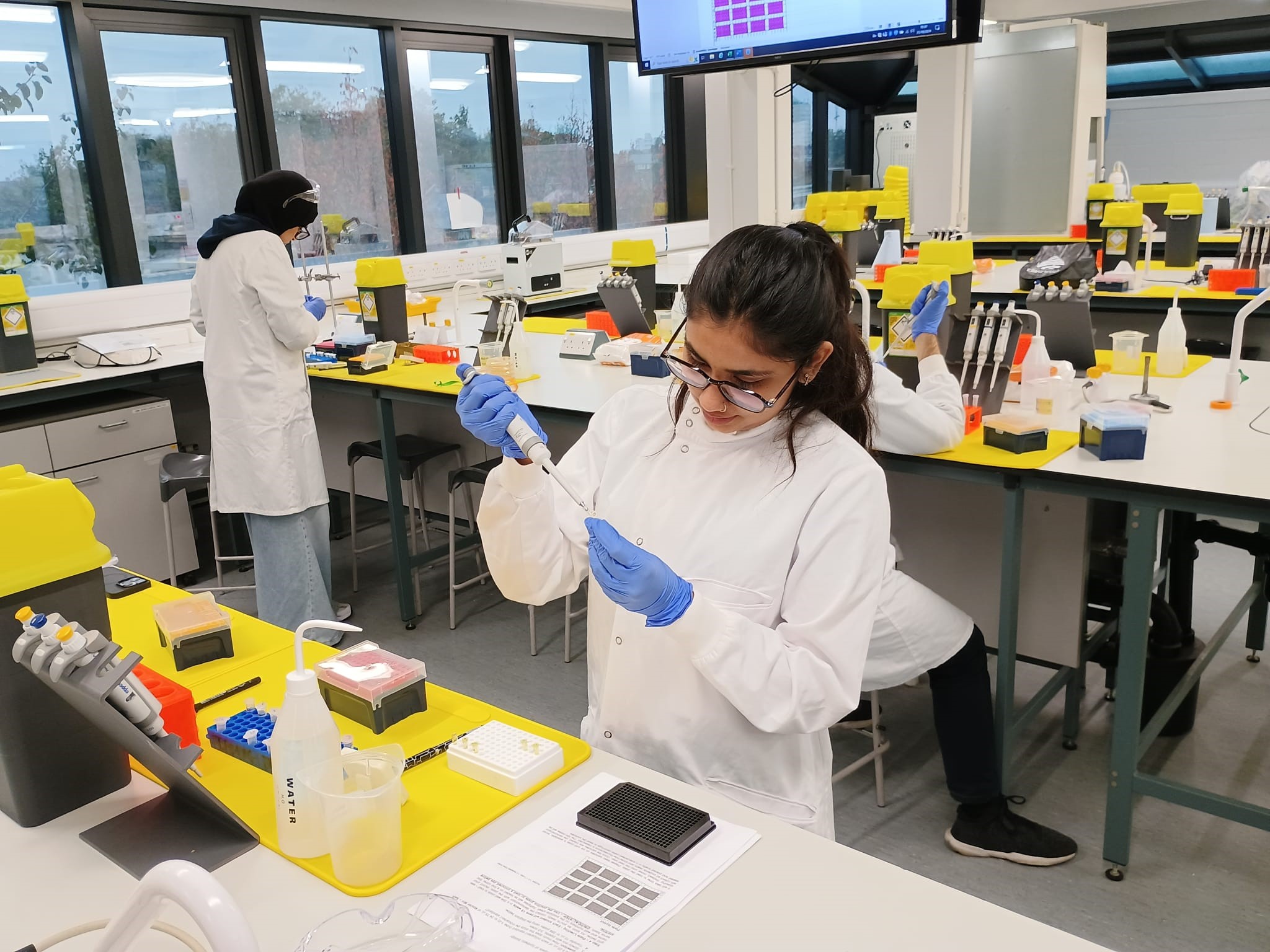Study options
- Starting in
- September 2025
- Location
- Mile End
- Fees
- Home: £15,250
Overseas: £29,950
EU/EEA/Swiss students
What you'll study
In the first semester, students will study four compulsory modules, covering Principles of Synthetic Biology, Industrial Biotechnology, Unix and Analysis of Large Genomic Datasets and Responsible Innovation and Commercialisation.
In semester two, students will take two compulsory modules covering Genome Editing in Biotechnology and Synthetic Biology, and Proteins and Biocatalysts in Biotechnology.
Students will also undertake a Biotechnology Research Project, which will be supervised by academics who specialise in a wide range of disciplines, including structural biology and evolutionary genetics.
Structure
- Six compulsory modules
- Final research project
Compulsory/Core modules
This module provides an introduction to the management and analysis of big data, focusing specifically on the analysis of genome sequence data. Lectures first introduce relevant data types and data handling skills. They subsequently cover the bioinformatics methods, algorithms and resources used for tasks such as read cleaning, genome assembly, gene finding, variant calling, population genomics, and caveats and quality control approaches for such analyses Practical exercises are used to imbue experience of the Unix command line, high performance computing, and the use of these technologies to run computationally intensive genome analysis tools.
During this module, students will run an experimental investigation involving laboratory work and/or computational work in a cutting edge area relating to biotechnology or synthetic biology, within the research environment of SBBS. The student will perform a research project that either investigates a specific problem, is hypothesis-led or has a specific focus on applied research. The student will regularly interact with their supervisor(s) to discuss, plan and troubleshoot their project, as well as learn project-specific skills. They will also attend internal research seminars and research group meetings and typically spend a proportion of each day (from Jan until July) in the laboratory doing research. The project will conclude with a series of short written and spoken reports: Poster Presentation, Oral Presentation and Project Report. The report will be in the form of a mock pre-print including a title, abstract, methods, results and discussion.
The module actively introduces you to the cutting-edge research field of synthetic biology, which is enabling far-reaching impacts in medicine, climate change, and manufacturing. The module explores the emerging potential of synthetic biology as we focus on learning the core principles, including the conceptual design, build, test, and learn cycle (DBTL) framework for engineering of biology. We will discuss its vital tools and navigate ethical considerations, encompassing both the potential misuse and the profound societal and economic impacts. We will embark on a transformative learning journey that unlocks the limitless potential of synthetic biology, empowering you to shape the future.
In this module we introduce you to the growing area of industrial biotechnology and its significance to the bioeconomy. Industrial biotechnology harnesses the power of biological processes and organisms to develop biosustainable solutions and products for a wide range of industries. This includes key products such as biofuels and biopharmaceuticals, as well optimisation procedures such as scaled up biological production and downstream processing. Overall, this field holds tremendous potential for transforming traditional industrial practices and addressing global challenges. This module will include a combination of seminars, workshops and hands-on practical work, as well as being exposed to experts in the field. You will gain a comprehensive understanding of the principles, applications, and future prospects of industrial biotechnology.
The module emphasizes practical learning and offers state-of-the-art knowledge in genome editing. It focuses primarily on understanding clustered regularly interspaced short palindromic repeats (CRISPR) and CRISPR-associated protein Cas9 (CRISPR-Cas9) as powerful tools for editing and detecting nucleic acids such as DNA and RNA. CRISPR-Cas9 is extensively used in modern biotechnology and synthetic biology laboratories, making it an essential practical skill for biologists in today's industry.
The module centers around engineering biological systems with a focus on responsible innovation and commercialisation. It acknowledges the significance of responsible innovation at both the national and international levels and its connection to content of the programme involving applying engineering principles to biological systems. Additionally, the module delves into the process of transforming an idea into a commercially viable product, the consideration of ethical and regulatory steps, securing financial investment, understanding intellectual property (IP) and patent development, and employing various strategies to leverage IP for commercialisation. The students' comprehension of these concepts will be evaluated through a Dragon's Den-style slide deck pitch, where they will seek start-up funding.
Proteins offer a viable alternative as we seek to transition away from the synthetic materials and heavy metal catalysts routinely used in synthetic chemistry. Both natural and synthetic protein catalysts provide a wealth of opportunity, particularly in obtaining structural and mechanistic insight. This module expands functional knowledge and detail which, in turn, will facilitate the future development of next generation biocatalysts. This module aims to refine the students understanding of how we can manipulate the function of proteins and enzymes for applications including sustainable materials (i.e., fibres), the breakdown of plastic in the environment, through to capturing carbon from the atmosphere.
Assessment
- 50% Modules
- 50% Research project
- You will be assessed by a mixture of formal examinations and coursework in your taught modules.
- You will undertake more self-directed work in completing your final Biotechnology Research Project.
Research project
Students will have the opportunity interact with academics who specialise in a wide range of disciplines, including structural biology and evolutionary genetics.
—Hands-on experience in the lab is where theory meets practice! I am grateful for the opportunity to learn and grow as I dive deeper into my studies.
Deep Dharmendra Rai, Msc student, 2024
Teaching
You will learn primarily through a combination of lectures and tutorials, in addition to a significant amount of independent study and research.
You will be assigned an Academic Adviser who will guide you throughout your time at Queen Mary. You will also be assigned a supervisor for your Biotechnology Research Project.
Where you'll learn
Facilities
Students will be able to utilise state-of-the-art facilities and technologies that experienced researchers in this area are using today including fluorescence microscopy, cryo-electron microscopy, cell-free systems, mass spectrometry and automation.

Campus
Teaching is based at Queen Mary’s main Mile End campus, one of the largest self-contained residential campuses in the capital. Our location in the heart of London’s East End offers a rich cultural environment.
The campus is 15 minutes by tube from Central London, where you will have access to many of the University of London’s other facilities, such as Senate House.
About the School
School of Biological and Behavioural Sciences
The School of Biological and Behavioural Sciences is one of the UK’s leading research departments, with a multi-disciplinary approach to teaching and research. We are a large and dynamic school with strong links with industry, offering students a stimulating and supportive learning experience.
Queen Mary University is also part of the Russell Group - a body of leading UK universities dedicated to research and teaching excellence.
We also collaborate with the School of Geography on the Centre for the Aquatic Terrestrial Environment (CATE). The facilities of which, some students can access for specific projects or modules.
Career paths
Students who successfully complete the programme will be equipped with the skills and knowledge to go into a variety of established and emerging biotechnology and synthetic biology start-ups and incubators, in addition to larger biotechnology companies employing graduates in this field. The UK is also home to the largest number of biotech start-ups in Europe (McKinsey), with job opportunities both inside and outside of London.
Fees and funding
Full-time study
September 2025 | 1 year
- Home: £15,250
- Overseas: £29,950
EU/EEA/Swiss students
Conditional deposit
Home: Not applicable
Overseas: £2000
Information about deposits
Queen Mary alumni can get a £1000, 10% or 20% discount on their fees depending on the programme of study. Find out more about the Alumni Loyalty Award
Funding
There are a number of ways you can fund your postgraduate degree.
- Scholarships and bursaries
- Postgraduate loans (UK students)
- Country-specific scholarships for international students
Our Advice and Counselling service offers specialist support on financial issues, which you can access as soon as you apply for a place at Queen Mary. Before you apply, you can access our funding guides and advice on managing your money:
Entry requirements
UK
Degree requirements
A 2:1 or above at undergraduate level in Biomedical Sciences; Biochemistry or related subjects.
Other routes
Applicants with a good 2:2 degree (55% or above) will be considered on an individual basis.
Find out more about how to apply for our postgraduate taught courses.
International
English language requirements
The English language requirements for our programmes are indicated by English bands, and therefore the specific test and score acceptable is based on the band assigned to the academic department within which your chosen course of study is administered. Note that for some academic departments there are programmes with non-standard English language requirements.
The English Language requirements for entry to postgraduate taught and research programmes in the School of Biological and Behavioural Sciences falls within the following English band:
Band 4: IELTS (Academic) minimum score 6.5 overall with 6.0 in each of Writing, Listening, Reading and Speaking
Please note, there are some postgraduate programmes with non-standard English language requirements in this School.
We accept a range of English tests and qualifications categorised in our English bands for you to demonstrate your level of English Language proficiency. See all accepted English tests that we deem equivalent to these IELTS scores.
Visas and immigration
Find out how to apply for a student visa.




